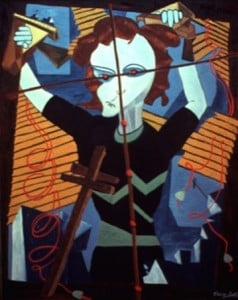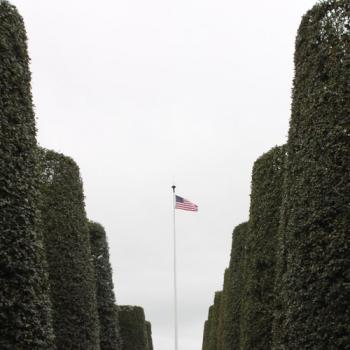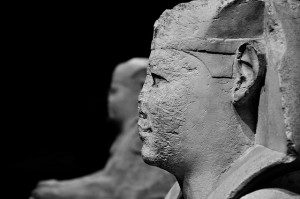 My middle son’s name is Asher. He is named after the protagonist of Chaim Potok’s classic bildungsroman My Name is Asher Lev.
My middle son’s name is Asher. He is named after the protagonist of Chaim Potok’s classic bildungsroman My Name is Asher Lev.
In the month before Asher was born, my friend Thom Smith loaned me a copy of the novel. Many books have affected me profoundly, but this one remains very near the top.
I had always loved writing and music, but the community in which I was reared did not value the kind of writing I felt compelled to do. With so many souls in need, how could I waste my time with stories that did not serve that purpose? If you do have a gift, I was told, you have an obligation to use it to further the Kingdom of God—in practical and measurable ways. That was their view of my writing; the music I loved, well that was written off as evil from the start.
For years, I tried to contort myself into acceptable shapes. I capitulated as best I could. I went to seminary, dreading the thought of ministry. While there, I told one of my professors about my writing. He said, great, we need writers. He even referred me to a guy who wrote gospel tracts for a living, so he could teach me how to do it. In those days my soul felt like a plant yanked from the earth roots and all, shrinking in on itself as it died.
The story of Asher Lev hummed true all the way into my bones.
Asher lives in a Hasidic Jewish home in the 1950s. From childhood, he has a compulsion to express himself through art. In one scene, five-year-old Asher gets so lost in drawing his sleeping mother with a pencil that he looks up only to realize his father has entered the room, and is standing there watching as he shades in her likeness, using cigarette butts and ashes from his mother’s ashtray.
“Who showed you to use cigarettes that way?” Asher’s father asks him.
No one showed him. Asher has a gift. This gift is not a good thing though, because it refuses to be tamed, reigned in, and held within the confines of family and religious tradition. To his father and his community, Asher’s gift is self-indulgence at best, but likely something more sinister. He draws what he is compelled to draw—which turns out to be viewed as sacrilege by his community.
His father, tells him. “I wish you wouldn’t spend all your time playing with pencils and crayons, Asher.” The rebbe tells him, “Asher, you have a gift. The gift causes you to think only of yourself and your own feelings.” The storekeeper tells him, “Asher, you are a scandal…. A son should not hurt his father…especially a father like Reb Aryeh Lev.”
Asher tries to comply. He stops drawing and enters the Ladover yeshiva, to do things the way he is told are right and proper. In class, he once again looks up to realize that he is drawing when a classmate yells for the teacher and all to hear, “You defiled a holy book! Asher Lev, you desecrated the Name of God! You defiled a Chumash!” He cannot stop drawing. It’s as if the images exist in some Platonic realm, and are trying to get into the world of objects, and he is the conduit they need.
Asher’s mother—already a nervous wreck after the death of her brother on a mission trip, and the relentless mission travel of her husband—is torn between her son and her Hasidic community. Eventually Asher paints what becomes his defining work of art: he uses Christian imagery to convey the suffering of his mother; he paints her crucified on window frames. It becomes his most famous painting: Brooklyn Crucifixion.
With this, Asher Lev goes too far. He is shunned. He leaves the community within which he was reared.
It took me many years to free myself from the gnawing sense that what I felt compelled to do, what I felt was my point for being in the world, was of no value, possibly even sinister. This was what I was struggling with when Thom handed me My Name is Asher Lev in the musty basement of Randolph Street Baptist Church. More than once, as I read it, I fought back tears.
And so, my middle son’s name is Asher.
Asher has just turned sixteen. All three of my children are talented musicians, but Asher has, from a young age, displayed a talent and intensity beyond anything that can be taught. He has also known what he wants to do with his life, and has a focus and drive rare in kids his age. When asked what he will do if playing music doesn’t work out, his eyes go blank, as if you are blathering pure gibberish at him. He cannot imagine doing anything else.
In the opening pages of the novel, Asher Lev tells the reader, “I will not apologize. It is impossible to apologize for a mystery.” He has voluntarily left his community, so as not to cause more pain and embarrassment to the ones he loves. He will not, however, turn his back on what he is in order to return.
I am speaking to all of my children when I say this: Asher, your gift is a mystery—a mystery that is beautiful, true, and right. Do not let institutions, or conventions dressed as tradition, or well-meaning adults try to drive that from you.
You know your name.
Vic Sizemore earned his MFA in fiction from Seattle Pacific University in 2009. His fiction and nonfiction are published or forthcoming in Story Quarterly, Southern Humanities Review, PANK Magazine, Pembroke, Saint Katherine Review, Rock & Sling and elsewhere. An excerpt from his novel The Calling was a finalist for the Sherwood Anderson Award; other excerpts from The Calling are published in Portland Review and are forthcoming serially in Connecticut Review. His short story “Hush Little Baby” won the 28th New Millennium Writings Award for Fiction. Sizemore teaches at Central Virginia Community College.















